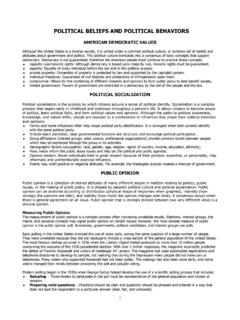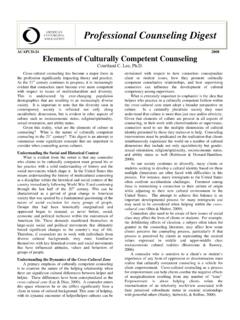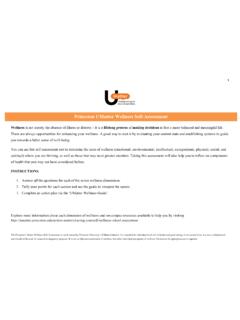Transcription of The Effects of Formative Assessment on Academic ...
1 Received: August 20, 2017 Revision received: November 21, 2017 Accepted: December 27, 2017 OnlineFirst: March 23, 2018 Copyright 2018 February 2018 18(1) 85 118 Research ArticleKURAM VE UYGULAMADA E T M B L MLER EDUCATIONAL SCIENCES: THEORY & PRACTICEC itation: Ozan, C., & K ncal, R. Y. (2018). The Effects of Formative Assessment on Academic achievement, attitudes toward the lesson, and self-regulation skills. Educational Sciences: Theory & Practice, 18, 85 118. * This paper was derived from the doctoral dissertation by Ceyhun Ozan conducted under the supervision of Prof. Dr. Remzi Y. K ncal. An earlier version was presented at III. International Eurasian Educational Research Congress held at Mugla, Turkey, March 2016; VI. International Congress on Research in Education held at Rize, Turkey, October 2016 and IV. International Congress on Curriculum & Instruction held at Antalya, Turkey, October Correspondence to: Ceyhun Ozan (PhD), Department of Curriculum & Instruction, Atat rk University, Erzurum 25000 Turkey.
2 Email: Department of Curriculum & Instruction, Atat rk University, Erzurum 25000 Turkey. Email: Ozan1 Atat rk University Remzi Y. K ncal2 Atat rk University The Effects of Formative Assessment on Academic Achievement, attitudes toward the Lesson, and Self-Regulation Skills*AbstractThe purpose of this research is to examine the Effects of Formative Assessment practices on students Academic achievement, attitudes toward lessons, and self-regulation skills in the fifth-grade social studies class. Mixed method research was used to conduct the study. The research group consisted of 45 students in the fifth grade of a secondary school in Erzurum in the Academic year 2014 2015, and a teacher who performed the practices. Experimental procedures were carried out for 28 weeks. Social studies performance tests, attitude inventories for social studies classes, self-regulatory learning skills scales, semi-structured interview forms, and observation forms were all used as data collection instruments.
3 As a result of the research, it was determined that the experimental group in which the Formative Assessment practices were performed had a significantly higher Academic achievement levels and better attitudes toward the class than the students did in the control group. With regard to the students self-regulation skills, although the Formative Assessment had a positive effect, no significant difference was found between the experimental and control groups. According to the researcher s observations and the interviews conducted with the teacher and students, it was determined that the general view on the application of Formative Assessment was notably Assessment Academic achievement attitudes toward the lesson Self-regulation Social studies86 EDUCATIONAL SCIENCES: THEORY & PRACTICEE ducational policymakers, teachers, and researchers are increasingly interested in Formative Assessment as it reflects and supports student learning (Bell & Cowie, 2001; Torrance & Pryor, 2001; Wiliam, 2011).
4 Formative Assessment is used at schools in 25 states as official policy (Altman et al., 2010). It is viewed as an essential strategy for reaching the targets set in many Organisation for Economic Co-operation and Development (OECD) countries and for acquiring qualifications in education. In many countries, guidance books have been developed to assist teachers in implementing a more systematic practice of Formative Assessment . In England, a Formative Assessment program was initiated in pre-school and primary school levels in 2000. In Scotland, similarly, teachers are encouraged to use Formative Assessment in their learning-teaching processes. New Zealand has also based its National Assessment Strategy, implemented in 1999, on Formative Assessment . Formative Assessment is viewed as the most critical Assessment strategy in many cities of Canada as well. Countries such as Finland, Germany, Sweden and Spain also emphasize the importance of Formative Assessment and the necessity of constant Assessment of each student using different Assessment methods such as verbal feedback, interviews and portfolio Assessment (Klinger, Volante, & DeLuca, 2012; Looney, 2011; Organisation for Economic Co-operation and Development [OECD], 2005; Swaffield, 2011).
5 In Singapore, Formative Assessment contributes to teachers professional development as well as to student learning by transferring professional development practices to the lesson plans (Koh, Lim, & Habib, 2010). Teachers use a range of Assessment activities and strategies in the classroom to gain comprehensive insight into how much students learn as part of Formative Assessment . In addition to providing feedback to the students, they analyze the information, comment on it, and use it to inspect and organize teaching. Students are active information providers. They not only participate in learning and teaching activities, but also use Assessment information to identify goals, make decisions about their own development, and develop an understanding of how qualified a work will be (Berry, 2008). Formative Assessment is defined by McManus (2008, p. 3) as a process in which teachers and students provide feedback during instruction to organize the learning and teaching process in order to increase student achievement.
6 According to Miller and Lavin (2007), Formative Assessment can be viewed as a valid and vital part of the blending of teaching and Assessment . Formative assessments inform teachers about whether the students have learned and they have an indicator qualification for how the teachers should plan their next lessons (Wuest & Fisette, 2012). There are four main components of Formative Assessment (Black, Harrison, Lee, Marshall, & Wiliam, 2003; Centre for Educational Research and Innovation [CERI], 2008; Wiliam, 2011; Wiliam & Thompson, 2007): (i) Explaining learning objectives and success criteria; (ii) increasing the quality of inquiry/dialogue; (iii) increasing the quality of marking/feedback/record keeping; and (iv) using self and peer , K ncal / The Effects of Formative Assessment on Academic Achievement, attitudes to Heritage (2008), goals and criteria enable students to know what and why they will learn so that they can become active participants in what otherwise can be a passive learning process.
7 When a new topic is introduced, it is crucial for students to share their goals, needs and criteria to get good results and notes (Gioka, 2007; Lombard & Schneider, 2013). From the beginning of the lesson, students are given the responsibility for their own learning, giving each one a chance to create their own knowledge of the subject, to work together with their peers and their teachers, to expand their framework and to move toward more complex knowledge and understanding (Ritchhart, Church, & Morrison, 2011). One of the benefits of sharing learning goals with learners is that they are given tasks in alignment with the goals (Moss & Brookhart, 2009).One of the primary elements of Formative Assessment is asking questions (Hodgson & Pyle, 2010). Teachers can spend one-third of their teaching time asking students questions (Moss & Brookhart, 2009). According to Borich (2014), 50 or more questions are typically asked in elementary and secondary school classrooms during lesson time.
8 Sometimes 80 percent of all school time can be spent on questions and answers. Such intense focus on a single strategy shows both its suitability and perceived effectiveness. However, not all questions are compelling. In other words, not all questions actively involve the learners in the learning process. Besides, most teachers do not use classroom dialogues to help students learn (Black et al., 2003). Asking questions in Formative Assessment is crucial to obtaining information about students learning and understanding. This objective can be achieved if the questions are active and effective at determining the learner s depth of knowledge (McMillan, 2014).At the center of Formative Assessment is the concept of feedback (Hattie & Timperley, 2007). The impact of Formative Assessment arises from the strength of the feedback provided to students about their learning and to teachers about their teaching (Andrade, Lui, Palma, & Hefferen, 2015).
9 According to Shute (2008, p. 154), Formative feedback is information transmitted to students that allows or encourages them to organize their thoughts or behaviors in order to improve their learning. Luckett and Sutherland (2000) emphasize that feedback provided through Formative Assessment has significant benefits when motivating students, helping students improve their learning, reinforcing their work, and providing them with a learning profile. Similarly, Snowball and Sayigh (2007) also point out that the value of teaching the teacher to provide individual students with feedback on their learning and performance improvement is are not the only source of feedback. Self and peer assessments can be taught carefully, guiding learners in how to provide constructive and learning-oriented feedback on their own (Andrade et al., 2015). Self- Assessment is a process in which students 88 EDUCATIONAL SCIENCES: THEORY & PRACTICE criticize their own work according to clearly stated expectations, usually provided in the form of goals or criteria, and then revise their work (Andrade & Valtcheva, 2009).
10 Self- Assessment is an excellent Formative Assessment strategy that provides students with immediate feedback on their performance according to established standards and criteria, and gives them information about how to make adjustments to improve what they learn and how they learn (Crooks, 2007). Harrison and Harlen (2006) also point out that self- Assessment is one of the critical elements of Formative Assessment because it helps students participate directly in learning objective activities. Peer review or peer feedback is one way for students to comment on other students work (Topping, 2009). Peer review is influential in creating a more participatory learning culture within the learning environment (Kollar & Fischer, 2010).Hattie (2009) evaluated 800 meta-analysis studies on educational factors based on their impact size. This Assessment included 52,637 studies and 146, 142 effect sizes investigating the Effects of educational factors on students Academic achievement.















